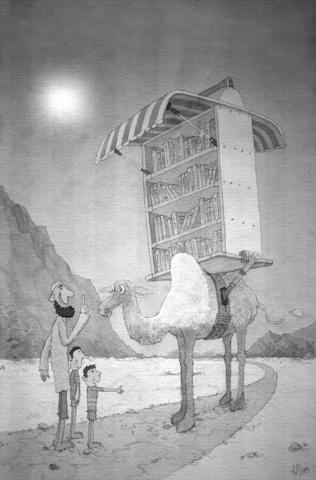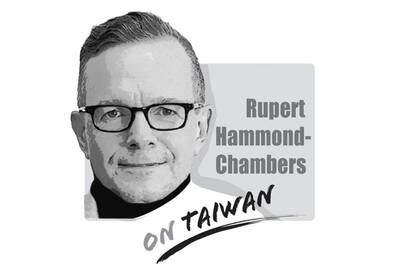Rukia, aged 14, leaps forward excitedly at the books spread on the floor. She is orphaned, survives on a diet of tea, bread and maize and lives in the African bush in a home built of twigs and dried grass. Books give her a reason to hope.
"I want to be a doctor when I leave school," she says in flawless English. "I want to help people who are sick. My parents died from tuberculosis when I was six. I hope they would be proud of me."
Picking Wake Up and Open Your Eyes by the African writer Edward Muhire, Rukia Adhan knows that literacy is fundamental to achieving her ambition, and besides, "reading is more interesting than anything else here."

ILLUSTRATION: YUSHA
Her ramshackle school set amid the flat pine trees and red-brown sand of rural Kenya suffers a shortage of books, but every two weeks Rukia and her friends gaze out expectantly to the arid wilderness for an unusual savior. It is a camel, which would be nothing extraordinary in this desert but for its cargo of 400 books for the children to borrow, enjoy and learn from.
The Camel Mobile Library Service lends more than 7,000 books to nomads in Kenya's impoverished North East Province, often because camels are the only means of crossing the inhospitable terrain. Many of the books are supplied by Book Aid International, the charity which gives more than half a million books a year to some of the world's poorest countries.
The thread of possibilities such work offers children who otherwise have nothing was evident last week near Garissa. Five hours' drive from the capital, Nairobi, it is a place of rubbish-strewn streets, stenches, fetid swamps, watchful vultures, HIV street signs ("Abstain from indiscriminate sex"), shreds of binliners hanging from trees, homes patched up with rags and scrap metal, and carts pulled by emaciated donkeys. And this is the "well off" part of town.
Beyond the clatter of an old typewriter at the Garissa Provincial Library is the humid office of Rashid Farah, the librarian in charge.
The scale of his task is spelt out by a notice on the wall: "The North Eastern Province has an illiteracy level of 85.3 percent compared to the national figure of 31 percent."
"Most of the people around here need books but cannot afford them. The children are very enthusiastic and happy when they see the camel coming. It is now part of their lives. But we have almost exhausted the supply of books and we need more," Farah said.
Each morning three camels -- one carrying two boxes of books, one loaded with a tent and one spare -- set off from the library to one of 10 drop-off points in the predominantly Muslim province, where few adults ever visit a permanent library. Many are farmers forced into a nomadic existence by drought or famine: Where their camels and goats go in search of pasture and water, they must follow, forcing their children to abandon school.
It was the turn of the village of Marmtu to welcome the camel mobile library recently. Life here has followed much the same rhythms for millennia: There is no electricity or running water and, although Kenya's mobile-phone network offers a better signal than that in parts of Britain, no one has a handset to receive it. The houses, or manyatta, are tiny structures of dried grass and tree branches which can collapse in the rainy season. Women in vividly colored robes draw water from a well and carry it in a jerry can on their heads or roll it forwards beneath their feet.
The children at Marmtu Primary School are visibly malnourished and not all can afford to buy from the mango seller who calls at lunchtime. The school, with 550 pupils aged from six to 16, needs basic tools if the cycle of poverty is ever to be broken.
Younger pupils are forced to share one textbook between four, while the older children have one between three. They are often in classes of 55 pupils to one teacher in rooms with bare concrete floors, or in crumbling mud brick huts where only crooked sticks supported the corrugated iron roof.
The school receives government funding of about US$700 a year.
Wayu Kofa, the deputy head, said: "We don't have enough books because the money we get from government is not enough to cater for all our needs, and parents are too poor to help -- they struggle to pay for school uniform and see books as the last priority."
Despite their circumstances, these children were not so different from any others as they gossiped, scrapped, kicked a football and chattered in Swahili, Somali or English.
There was excitement when the library camels appeared on the horizon, refusing to be hurried from their patient progress. The animals set down their cargo and the staff from the Garissa Provincial Library assembled the tent, laid down mats and unpacked the books.
For the children who have no television, music or computer, the sight of a book offers the promise of escape and self-improvement.
Soon they were scrambling over each other to get the latest delivery of titles ranging from How Pig Got His Snout, The Orange Thieves and Shaka Zulu to the more prosaic Practical Primary English, Comprehensive Mathematics and Improve Your Science and Agriculture.
Among those eagerly queuing was Mohamud Abdi, 12.
"I get books from the camel as it's difficult to find them in school," he said. "I like reading because I want to be educated so I can get a job and help my family. My parents keep goats but don't have many. I want to be a teacher."
Books save lives. Worldwide, it is estimated that this year alone failure to reach the UN's goal for educating girls means that more than a million mothers and children will die. These mothers are unlikely to find out about safe contraception and drinking water, or how to avoid disease in childhood.
The gender gap is stark but the camel mobile library is for both sexes.
Eunice Okwero, 15, who was holding a copy of Motherless Baby, said: "I like stories that tell me what happened in the past. When I leave school I want to join the library."
The camel scheme is overseen by the Kenya National Library Service, a partner of Book Aid International, which supplies around 50,000 books to the country each year. Their joint activities also include training teachers to be school librarians, an Aids information awareness service and assistance for the visually impaired.
"It's a painful experience when I look at these children. They want to eat, but they have nothing. They want to read, but they have nothing," said Deborah Nyabundi, the national library's acting director.
"I believe it is our moral duty to help them. They have high ambitions and we don't want to kill those ambitions, but how will they become doctors without education?
Having lived through former British prime minister Boris Johnson’s tumultuous and scandal-ridden administration, the last place I had expected to come face-to-face with “Mr Brexit” was in a hotel ballroom in Taipei. Should I have been so surprised? Over the past few years, Taiwan has unfortunately become the destination of choice for washed-up Western politicians to turn up long after their political careers have ended, making grandiose speeches in exchange for extraordinarily large paychecks far exceeding the annual salary of all but the wealthiest of Taiwan’s business tycoons. Taiwan’s pursuit of bygone politicians with little to no influence in their home

In 2025, it is easy to believe that Taiwan has always played a central role in various assessments of global national interests. But that is a mistaken belief. Taiwan’s position in the world and the international support it presently enjoys are relatively new and remain highly vulnerable to challenges from China. In the early 2000s, the George W. Bush Administration had plans to elevate bilateral relations and to boost Taiwan’s defense. It designated Taiwan as a non-NATO ally, and in 2001 made available to Taiwan a significant package of arms to enhance the island’s defenses including the submarines it long sought.
US lobbyist Christian Whiton has published an update to his article, “How Taiwan Lost Trump,” discussed on the editorial page on Sunday. His new article, titled “What Taiwan Should Do” refers to the three articles published in the Taipei Times, saying that none had offered a solution to the problems he identified. That is fair. The articles pushed back on points Whiton made that were felt partisan, misdirected or uninformed; in this response, he offers solutions of his own. While many are on point and he would find no disagreement here, the nuances of the political and historical complexities in
Taiwan faces an image challenge even among its allies, as it must constantly counter falsehoods and misrepresentations spread by its more powerful neighbor, the People’s Republic of China (PRC). While Taiwan refrains from disparaging its troublesome neighbor to other countries, the PRC is working not only to forge a narrative about itself, its intentions and value to the international community, but is also spreading lies about Taiwan. Governments, parliamentary groups and civil societies worldwide are caught in this narrative tug-of-war, each responding in their own way. National governments have the power to push back against what they know to be